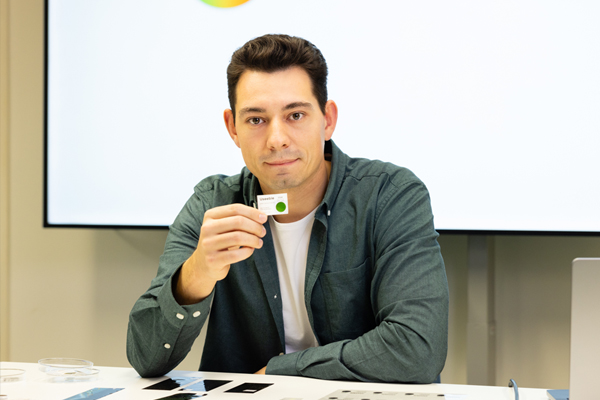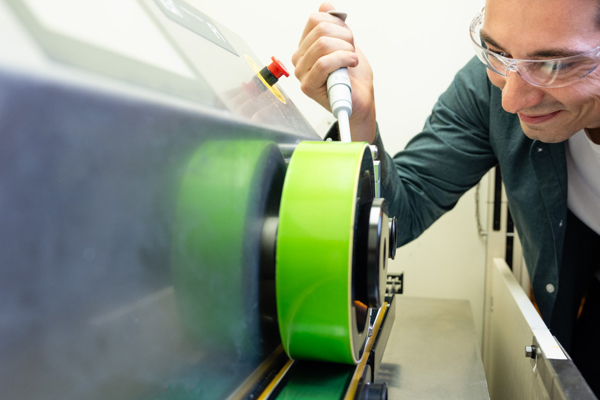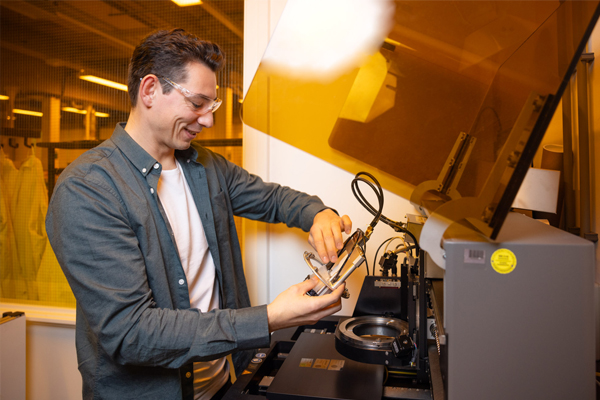Pioneering with innovative ink technology
17 April 2025

Yari Foelen, a chemical engineer and entrepreneur born in Belgium, is developing cutting-edge solutions that address some of the most pressing issues in logistics. How to ensure that temperature sensitive products remain safe to use after transport? Foelen’s background in chemical engineering laid the foundation for his answer: innovative ink technology.
‘We want to help people reduce waste by providing an intuitive way to determine whether items are still safe to consume’
After completing his bachelor’s degree in Belgium and a master’s in Eindhoven, Foelen spent time in Australia before returning to pursue a PhD. It was during that PhD that Foelen’s novel technology was first conceived – a material that changes color in response to temperature, signaling when a material has been exposed to high temperatures that could lead to spoilage or degradation.

Foelen recalls: “I was inspired by other startups in my research group and saw an opportunity to bring lab technology into the commercial world. This led to the development of inks that gradually change color after printing, with a rate that depends on the temperature exposure. Hence, the printed indicator gives an intuitive signal: changing the color from green to yellow to red, to indicate when a product has suffered a crucial quality loss.”
The start of Useeble
Foelen was granted the opportunity to participate in the Faculty of Impact program, marking the start of his entrepreneurial journey. After two years in the program Foelen had gained enough business knowledge to found Useeble, a startup dedicated to leveraging ink technology for large-scale applications. “The dream is to bring our ink technology into every conceivable application – from fruits, vegetables, and meat, to medicines and chemicals. We want to help people reduce waste by providing an intuitive way to determine whether items are still safe to consume,” says Foelen.

The role of Faculty of Impact
The journey from researcher to entrepreneur was largely shaped by the Faculty of Impact program, which provided access to critical resources in business development, mentorship, and networking opportunities. “The program gave us invaluable insights into areas outside of my expertise, such as intellectual property rights, financial planning, and contract negotiations,” Foelen says. “Without the program, I’d probably be working a different job by now. The funding, knowledge, and connections we gained allowed us to move forward faster and avoid constantly struggling for resources.”
Overcoming regulatory challenges
However, turning this vision into reality comes with significant challenges. “One of our biggest hurdles is getting regulatory approval,” he says. “For food and medical applications, especially in Europe, the regulations are very strict. That’s why we’re also developing products in areas where regulatory barriers are lower, like chemicals. We even experimented with non-consumable goods, such as flowers, but found that the packaging changes too frequently for our technology to be effective.”
‘The funding, knowledge, and connections we gained allowed us to move forward faster and avoid constantly struggling for resources’
Scaling and market strategy
With a strong foundation in place, Useeble is now focused on expanding partnerships and production capabilities. Rather than seeking large-scale investments, the company is more interested in loans and collaborations with industry partners who can help scale the technology.
Currently, Useeble’s production costs are too high to compete in the low-cost food packaging sector. “Our ink is the cheapest alternative out there, but still not cheap enough. Once we scale up production, our costs will drop significantly, and we’ll be more competitive,” Foelen says.
The road ahead
Foelen is optimistic about the company’s future. He anticipates that Useeble will have the first commercial products on the market within the next two to three years. However, breaking into the food sector on a large scale may take five to ten years as the team continues to refine the technology and meet the necessary regulatory requirements.
In the meantime, Useeble is focusing on quicker routes to market. “In the chemical industry, our ink is competing in an established market where current temperature indicators are ten times more expensive than ours. That makes this sector the fastest path to commercialization,” Foelen explains.
A vision for the future
Useeble’s ultimate vision is to revolutionize how products are monitored and handled across the supply chain, thereby reducing waste and improving safety for consumers. The potential applications of Useeble’s ink technology are vast – from ensuring the quality of fresh produce during long-distance transport to offering consumers peace of mind when checking the freshness of their food at home.
“Our ink is a beautiful, intuitive product. It changes color from green to red – it’s almost magical. There’s no need for explanation. People see it and instantly understand,” Foelen says. With the right partnerships, regulatory approvals, and scaling strategies, he believes Useeble can make a lasting impact across industries worldwide, driving innovation and sustainability in logistics and beyond.